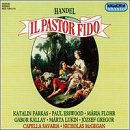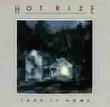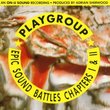| All Artists: George Frideric Handel, Nicholas McGegan, Capella Savaria, Paul Esswood, József Gregor, Katalin Frakas, Mária Flohr Title: Handel - Il pastor fido / Frakas, Esswood, Flohr, Kállay, Lukin, Gregor, Capella Savaria, McGegan Members Wishing: 1 Total Copies: 0 Label: Hungaroton Release Date: 4/18/1994 Album Type: Import Genre: Classical Styles: Opera & Classical Vocal, Historical Periods, Baroque (c.1600-1750) Number of Discs: 2 SwapaCD Credits: 2 UPCs: 750582167423, 5991811291228 |
Search - George Frideric Handel, Nicholas McGegan, Capella Savaria :: Handel - Il pastor fido / Frakas, Esswood, Flohr, Kállay, Lukin, Gregor, Capella Savaria, McGegan
CD DetailsSimilar CDs |
CD ReviewsTruly ravishing music and a more-than-acceptable performance Ingrid Heyn | Melbourne, Australia | 02/24/2007 (4 out of 5 stars) "Il Pastor Fido is in many respects like a pastiche of Handel's best melodies. The first version of the opera was the second opera which Handel put on for London, and it's fascinating that he later entirely reworked the opera (with more spectacle, ballet and chorus work to suit the English taste) - not once, but twice more!
For those who are interested in knowing a little of the background of this opera, let me mention that a considerable amount of the material in the first version of this opera was taken from cantatas that Handel had composed in Italy, and from earlier oratorios. The peaceful and pastoral quality of the work was maintained throughout in the orchestration (no brass, considerable use of lighter instruments such as transverse flutes and oboes, continuo-based arias, the effective use of two natural horns for additional colour, etc.), and the melodic material is elegant and sublimely lovely. But of course this recording is of the third version, and is far more of a pasticcio than the first version. Handel borrowed a lot of the material here from his other operas, and he adjusted the musical material (as was the practice of the day) to suit his singers. He maintained much (in this version) of the orchestral colouring he'd used for the 1st version. The result is charming. It's a pity that one of the arias written for Mirtillo in the 3rd version is replaced here by the 1st version aria, but it's understandable - Handel was writing for a soprano castrato, and such creatures are no longer to be found. Instead, we have the excellent Paul Esswood in the role of Mirtillo. He's delightful to listen to. It's very much worth noting that there were great countertenors before Andreas Scholl and David Daniels - and Paul Esswood is an example. Listen to his heartbreakingly lovely first aria "Lontan del mio tesoro" - it speaks directly to the heart with sensitive and almost oboe-like tone. This reed-like quality can be extraordinarily effective. Also quite lovely is Katalin Farkas in the role of Mirtillo's beloved, Amarilli. Her first appearance in recitativo accompagnato is affecting and sympathetic, offering a good opportunity for contrast with the more manly (yet still high and relatively light) sound of Mirtillo as he overhears her confession that only he means anything to her. She has a voice of delicate loveliness, combined with an emotional tremulous quality that works beautifully to convey her character's vulnerability. Maria Flohr as Eurilla is not really satisfying as the jealous scheming nymph Eurilla, but often the tone is attractive, and her performance is graceful and quite listenable. (One longs for the talents of Vivica Genaux in this sort of role, though. Wouldn't that be delightful?) The hapless nymph Dorinda is sung with sweetness by mezzo-soprano Marta Lukin - again, I am left feeling that the performance is adequate but not superb. I would love to hear this role sung by Cecilia Bartoli, who would make of it something quite heart-stoppingly lovely, but I suppose that would be luxury casting of a role not sufficiently major. The tenor Gabor Kallay is mostly delightful in the role of Silvio, the hunter who is brought to return Dorinda's love only after the latter is wounded. His singing is shapely and full of beautiful tone. While I feel his coloratura is not really bravura, it does (just) meet the challenges of his role, and he's often a pleasure to hear. Jozsef Gregor lends his distinguished bass to the brief role of Tirenio. One of the unmissable highlights in this opera is the frankly superb duet between Mirtillo and Amarilli, sung at the end of the opera as the threat of ancient ritual sacrifice is removed and Amarilli is no longer condemned. The blend between Paul Esswood and Katalin Farkas is lovely indeed, and the duet "Caro / Cara" is an astonishing display of rapid passagework and lovely tone. The recorded sound is resonant and bright, certainly allowing the elegance and charm of this lovely music to breathe in beautifully shaped phrases. The conducting by Nicholas McGegan is immaculate - one senses a fine musical and dramatic intelligence here, and it's no surprise that McGegan is considered one of the truly good Handel conductors. In short, while this isn't a perfect recording, it's often very beautiful, and never less than charmingly elegant. Recommended." |


 Track Listings (30) - Disc #1
Track Listings (30) - Disc #1

